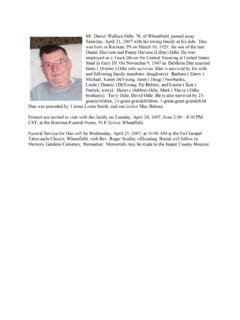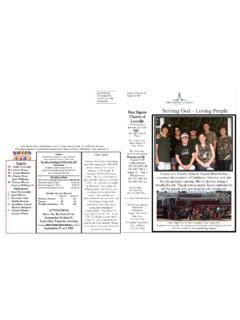Transcription of FRANCESCO ALBERONI FALLING IN LOVE AND LOVING
1 FALLING IN LOVE AND LOVING 1 FRANCESCO ALBERONI FALLING IN LOVE AND LOVING FALLING IN LOVE AND LOVING 2 CHAPTER ONE We fall in love. We say it, but what does it mean? To capture the essence of this only partially-charted emotional territory, at once familiar and enigmatic to us all, we need to think in a new way. Admittedly, the rule in most scholarly work to is build up gradually to a revolutionary definition, but I think that to do so would less than useful here.
2 I want to entice you to think in a new way straight off. At the same time I naturally aim to be as precise in my language and theory-making as possible, seeing that an accurate definition for the state called FALLING in love means reaching, with all due respect, beyond the traditional realms of psychology, sociology, and art. But this is important because our FALLING in love is notan instance of sexual sublimation, nor a phenomenon of everyday life, nor a trick of the imagination it is something very different.
3 FALLING in love is a formative state; scientifically it may be termed nascent , meaning in more common language that FALLING IN LOVE AND LOVING 3 it is the ignition state of a special collective movement made up of solely two the term collective movement intentionally because FALLING in love is not an ungraspable, transcendental occurrence, divine or diabolic as the case may be. The experience of FALLING in love shares the essential traits of any collective movement, which is a well-known sociological category, yet at the same time it retains its own unmistakable nature.
4 No one would think, for example, to confuse it with such other examples of collective movements as the Protestant Reformation, the student protest movement of the 1960s, the Feminist movement, the Islamic movement led by Khomeini, or the No-Globals of today. It simply remains a special case within the same genre. Indeed, the great mass collective movements in history and the ignition state of FALLING in love are closely related in terms of the type of forces that they free up and set in motion, as well as in terms of the analogous experiences of solidarity and joy in life, or the feelings of renewal, which they stimulate.
5 Their fundamental difference, on the other hand, lies in the fact that a very large number of people participate in these mass FALLING IN LOVE AND LOVING 4 collective movements, which are also open to any others who may care to join them. In so far as FALLING in love , however, is a collective movement with just two participants, it embraces only them and appeals to the universal values that only they hold. This exclusive aspect makes FALLING in love both a singular state and, on account of certain of its features, an unmistakable one.
6 Sociologists have already studied collective movements in detail and described the specific sort of experience they represent. Durkheim is one of the first to come to mind. His analysis of states of collective excitement is this: A man who experiences such sentiments feels himself dominated by outside forces that lead him and pervade his milieu. He feels himself in a world quite distinct from that of his own private existence. This is a world not only more intense but also qualitatively different.
7 Following the collectivity, the individual forgets himself for the common objective and his conduct is oriented in terms of a standard outside [These forces] need to overflow for the sake of overflowing, as in play without any specific such moments, this higher form of life is lived with such intensity FALLING IN LOVE AND LOVING 5 and exclusiveness that it monopolizes all minds to the more or less complete exclusion of egoism and the commonplace.
8 * When he wrote these words, Durkheim was not thinking at all about FALLING in love. He had in mind the French Revolution and other great revolutionary events. In truth, however, the experience which he describes above extends beyond these. It characterizes not only great historical developments like the French Revolution and the spread of Christianity or Islam, but also historical movements smaller in scale. Indeed, it is present in the initial phase (which we are calling the ignition state ) of all collective movements, and that includes, most curiously, that of FALLING in love.
9 We find another similar description of this experience in Max Weber s study of social phenomena which generate much creativity, enthusiasm and fervent belief. In Weber, however, they become manifestations of power; in other words, something that depends on the emergence of aFALLING IN LOVE AND LOVING 6 *Emile Durkheim, Value Judgments and Judgments of Reality in Sociology and Philosophy,trans. Pocock (Chicago: Free Press, 1953), FALLING IN LOVE AND LOVING 7 charismatic leader.
10 ** With his appearance of the scene, this leader breaks with tradition, drags his followers into a heroic adventure, and inspires in the latter the experience of inner rebirth and radical change in outlook of the sort which Saint Paul termed metanoia . Under the charismatic leader s guidance, economic concerns give way to the unhampered pursuit of faith and ideals and to a life filled with enthusiasm and passion. Weber attributes all these things to the leader that is, to the particular traits of the leader. In essence, he makes the same mistake each of us makes when we fall in love: we attribute the extraordinary experience we are having to the traits of the person we love, when in reality the person we love is not any different from others (any more than we ourselves are).






